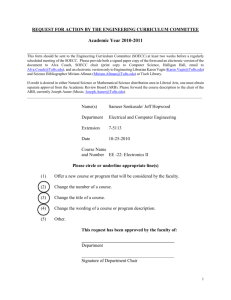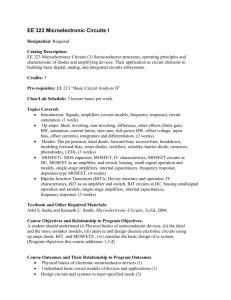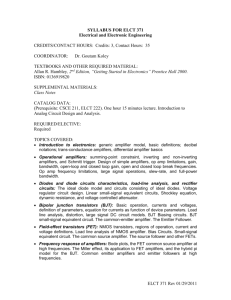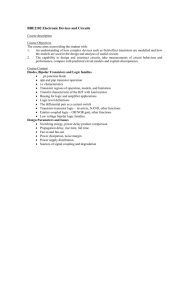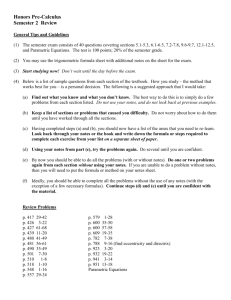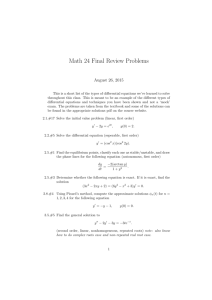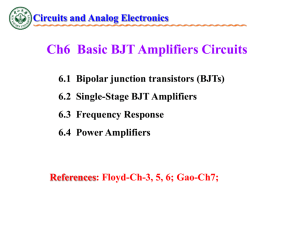Click for the detail of the course content
advertisement
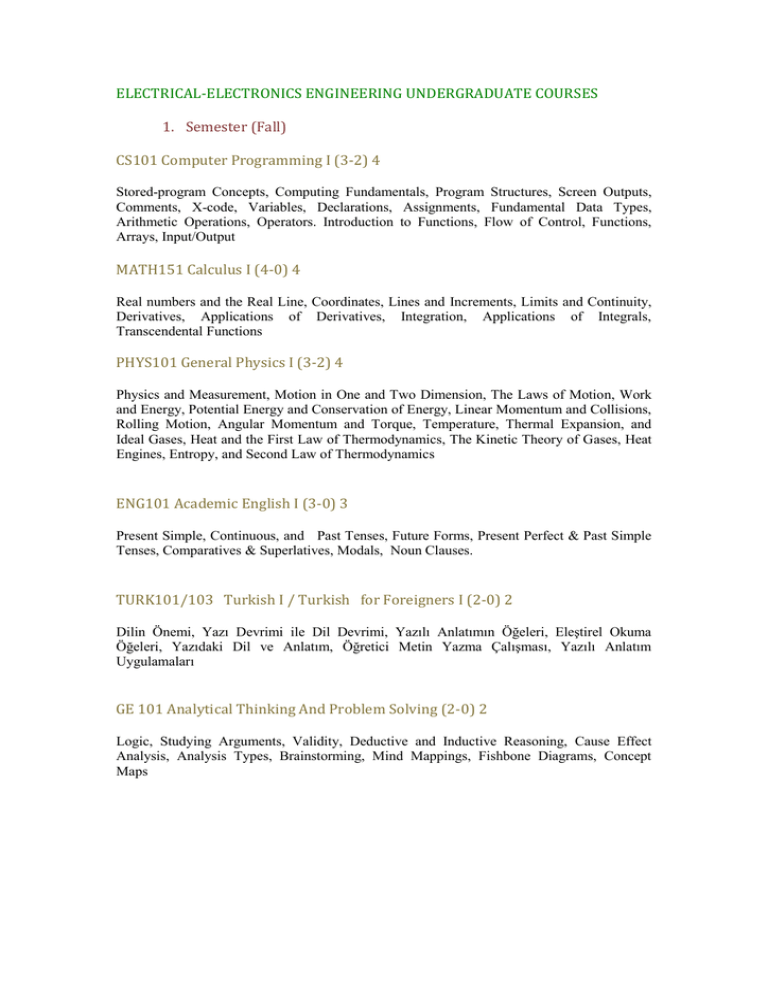
ELECTRICAL-ELECTRONICS ENGINEERING UNDERGRADUATE COURSES 1. Semester (Fall) CS101 Computer Programming I (3-2) 4 Stored-program Concepts, Computing Fundamentals, Program Structures, Screen Outputs, Comments, X-code, Variables, Declarations, Assignments, Fundamental Data Types, Arithmetic Operations, Operators. Introduction to Functions, Flow of Control, Functions, Arrays, Input/Output MATH151 Calculus I (4-0) 4 Real numbers and the Real Line, Coordinates, Lines and Increments, Limits and Continuity, Derivatives, Applications of Derivatives, Integration, Applications of Integrals, Transcendental Functions PHYS101 General Physics I (3-2) 4 Physics and Measurement, Motion in One and Two Dimension, The Laws of Motion, Work and Energy, Potential Energy and Conservation of Energy, Linear Momentum and Collisions, Rolling Motion, Angular Momentum and Torque, Temperature, Thermal Expansion, and Ideal Gases, Heat and the First Law of Thermodynamics, The Kinetic Theory of Gases, Heat Engines, Entropy, and Second Law of Thermodynamics ENG101 Academic English I (3-0) 3 Present Simple, Continuous, and Past Tenses, Future Forms, Present Perfect & Past Simple Tenses, Comparatives & Superlatives, Modals, Noun Clauses. TURK101/103 Turkish I / Turkish for Foreigners I (2-0) 2 Dilin Önemi, Yazı Devrimi ile Dil Devrimi, Yazılı Anlatımın Öğeleri, Eleştirel Okuma Öğeleri, Yazıdaki Dil ve Anlatım, Öğretici Metin Yazma Çalışması, Yazılı Anlatım Uygulamaları GE 101 Analytical Thinking And Problem Solving (2-0) 2 Logic, Studying Arguments, Validity, Deductive and Inductive Reasoning, Cause Effect Analysis, Analysis Types, Brainstorming, Mind Mappings, Fishbone Diagrams, Concept Maps 2. Semester (Spring) MATH152 Calculus II (4-0) 4 Transcendental Functions, Techniques of Integration, Infinite Series, Multivariable Functions and Partial Derivatives, Multiple Integrals, Integration in Vector Fields PHYS102 General Physics II (3-2) 4 Electric Fields, Gauss' Law, Electric Potential, Capacitance and Dielectrics, Current and Resistance, Direct Current Circuits, Magnetic Fields, Sources of the Magnetic Field, Faraday's Law, Inductance, Alternating Current Circuits, Electromagnetic Waves ENG102 Academic English II (3-0) 3 Thematically organized readings within the reading for the real world are based on real world events and issues. Each reading text is accompanied by both comprehension and vocabulary exercises. Grammar materials are prepared by the teacher for the learners. TURK102/104 Turkish II / Turkish for Foreigners II (2-0) 2 Beden Dili, Diksiyon, Sözlü Anlatım Türleri, Tartışma, İyi Konuşmanın Ögeleri, Sunum EE104 Introduction to Electrical-Electronics Engineering (2-0) 2 Definition of an Engineer, History of Engineering, History of EE Engineering, Ethic of Engineering, Introduction to Electrical-Electronics Engineering, Activities, Seminars EE142 Introduction to Numerical Methods (3-0) 3 Introduction to Mathematical Compilers, Approximations and Numerical Calculations in Engineering, Basic Operations in Mathematical Compilers, Loops and Statements, Special Functions, Numerical Integration and Differentiation, Root Finding Methods, Implementation of Random Events, Simulations 3. Semester (Fall) MATH201 Linear Algebra (4-0) 4 Vector Spaces, Matrices, Linear Transformations, Diagonalization, Normed Product Spaces, Inner Product Spaces, Orthogonality, Projection Theorem MATH202 Differential Equations (3-0) 3 Basic Concepts, An Introduction to Modeling and Qualitative Methods, Classification of First Order Differential Equations, Applications of First-Order Differential Equations, Linear Differential Equations: Theory of Solutions, The Method of Undetermined Coefficients, Variation of Parameters, Initial Value Problems for Linear Differential Equations EE201 Circuit Theory I (3-2) 4 Introduction to Circuit Theory and Circuit Variables, Kirchoff´s current, Voltage and Current Division, Node – Voltage and Mesh – Current Analysis Techniques, Linearity and the Superposition Principle, Thevenin and Norton Theorems, Equivalent Circuits, Operational Amplifiers, Phasors and Impedance/Admittance CS203 Discrete Mathematics (3-0) 3 This course seeks to place on solid foundations the most common structures of computer science, to illustrate proof techniques. Upon successful completion of this course students will be able to practically use fundamental mathematical notation and concepts, solve elementary combinatorial and counting problems, some advance counting techniques including the principle of inclusion-exclusion and pigeonhole principles, precisely state logical argument, handle the standard logical symbols with some confidence, recognize and employ basic mathematical proof techniques (direct proof,, proof by contradiction), construct simple proofs that utilize the Principle of Mathematical Induction. ATA 101/103 Atatürk Principles and Revolution History I/ Atatürk Principles and Revolution History for Foreigners I (2-0) 2 Atatürk İlkeleri ve İnkılâp Tarihi Dersinin Amacı, İnkılâp ve Benzeri Kavramlar, Osmanlı Devletinin Yıkılışının Nedenleri, Osmanlı İmparatorluğunda Fikir Hareketleri, I. ve II. Balkan Savaşları, Mondros Mütarekesi ve Anadolu’nun İşgali, Kuva-yı Milliye Çalışmaları, Büyük Türkiye Millet Meclisinin Açılışı, Milli Mücadele Savaşı, Mudanya Mütarekesi ve Lozan Barış Antlaşması 4. Semester (Spring) MATH203 Probability and Random Variables (3-0) 3 Introduction to Statistics, Sampling Theory, Estimation Theory, Test of Hypothesis and Significance, Curve Fitting, Regression and Correlation MATH206 Complex Analysis (3-0) 3 Complex Numbers, Complex Functions, Continuity and Derivative of Complex Functions, Analytic Functions, Conformal Mappings, Complex Integration, Cauchy’s Theorem, Taylor Series, Laurent Series, Residue Theorem. EE202 Circuit Theory II (3-2) 4 Sinusoidal Steady State Analysis, AC Steady-State Power, Laplace Transform, Resonance and Filters, Bode Diagrams EE232 Electronics I (3-2) 4 Semiconductors, P-N Junction Diodes, Analysis of Diode Circuits, Rectifier Circuits, Multiple Diode Circuits, Zener Diodes, Bipolar Junction Transistors (BJTs): DC and AC Analysis of BJT, Single-Stage BJT Amplifiers and Design Examples of BJT Circuits. ATA 102/104 Atatürk Principles and Revolution History II/ Atatürk Principles and Revolution History for Foreigners II (2-0) 2 Cumhuriyetin İlanı, Atatürk’ün İnkılâbı ve Hedefleri, Siyasal Alanda İnkılâp Hareketleri, Hukuk Alanında İnkılâp Hareketleri, Toplumsal Yaşantının Düzenlenmesi, Türk İnkılâbının Dayandığı İlkeler, Türk İnkılâbının Temel Nitelikleri, Atatürkçülüğün Bugünkü Durumuna Dair Değerlendirmeler 5. Semester (Fall) EE351 Electromagnetic Field Theory (3-0) 3 Static Electric Fields, Steady Electric Currents, Magnetostatics, Time Varying Fields, Maxwell Equations EE331 Electronics II (3-2) 4 Junction Field-Effect Transistors (JFETs), JFET Biasing, High Frequency Response of Bipolar junction transistors (BJTs) and JFETs, Broadband Amplifier Design, Cascade Amplifiers, Multistage Amplifiers, BJT Differential Amplifier, Operational Amplifiers, Power Amplifiers, Class A Output Stage and Class B Output Stage, Low and High Frequency Response of BJT and FET Amplifiers, Comparators, Regulators. EE321 Signals and Systems (3-0) 3 Concepts of Signals and Systems, Linear Time-Invariant Systems, Difference and Differential Equations, Laplace, Z- and Fourier Transforms EE341 Digital Design (3-2) 4 Digital Systems and Binary Numbers, Boolean Algebra, Logic Gates, Gate Level Minimization, Combinational Logic, Sequential Logic, Registers and Counters, Hardware Description Language EE361 Electromechanical Energy Conversion I (3-0) 3 Fundamental Concepts of Energy and Energy Conversion, Electromagnetic Fundamentals, Magnetic Circuits, Transformers, Principles of Electromechanical Energy Conversion, Singly and Multiply Excited Systems, DC Generators, DC Generator Types, Armature Response, Commutation, DC motors, DC Motor Types, Speed Control, Special DC generators. 6 Semester (Spring) EE352 Electromagnetic Waves (3-0) 3 Time-varying Fields and Maxwell’s Equations, Plane Electromagnetic Waves EE382 System Control Theory (3-0) 3 Modeling of Dynamic Systems, Response of Linear Systems, Feedback and Stability, Classical Feedback Control, Modern Control Theory, Matlab Applications. EE342 Microprocessors (3-2) 4 Introduction to Microprocessors and Microcomputers, Software Architecture of the 8088 and 8086 Microprocessors, 8088/8086 Microprocessor Programming, PIC programming, Special Purpose Registers, Seven Segments, LCD, Relays, Interrupts, Memory Devices, Circuits, And Subsystem Design, EE362 Electromechanical Energy Conversion II (3-2) 4 Pulsating And Rotating Magnetic Fields, EMF Induced in a Winding, Induction Machines (Asynchronous machines), and Induction Machine: Types, Equivalent Circuits, Steady State Analysis and Control of Induction Machines, Power Transfer, Synchronous Generators, Equivalent Circuit and Applications, Stability, Synchronous motors, Equivalent Circuit and Applications, Single-Phase Induction Machines, Double Rotating Field Theory, Two-Phase Servomotors, Step Motors EE364 High Voltage Techniques (3-0) 3 Electrostatic fields, Basic Electrode Systems, Electrode Systems in Multi-Dielectrics, Discharge Phenomena in High Voltage Techniques in Gases, Vacuum, Solids and Liquids (Tow-send-Streamer Theories) Breakdown in Composite Materials and Their Electrical Properties, Generation of High Voltages, Measurement of High Voltages EE366 Lighting Design and Interior Installation Project (3-0) 3 Light Theories, Eye, Sensitivity and Vision Types. Light Reflection, Absorption and Transmission Phenomenon, Definition of Lighting Terms, Lighting Methods, Internal Lighting Systems and Calculations, Lighting Apparatus and Armatures, Photometric Measurements, Pre-project Preparation Fundamentals, Interior Electrical Installations, Low Current and High Current Systems and Drawings, Feeder, Column and Main-Column Line Formation, Fundamentals of Practical Application Project Preparations. 7 Semester (Fall) EE491 Senior Design Project I (0-6) 3 Selection of a Project Topic; Literature Survey; Experimental Set-Up; Data Collection; Interpretation of data; Writing and Presenting a Project. EE409 Entrepreneurship (2-2) 3 The aim of this course is to provide students with the basic knowledge in entrepreneurship. The course also deals linked to leadership, motivation and group dynamics. When it comes to entrepreneurship, this course aims at providing different perspectives related to the conditions needed for entrepreneurship to happen as well as innovation. 4TH YEAR TECHICAL ELECTIVE COURSES EE473 Introduction to Medical Computing (3-0) 3 Basic structure and modeling of biological tissue and its characteristics, Tomographic systems in today’s medicine, The principals involved in using of computers for data acquisition, data privacy, Signal processing and medical imaging, Stroke imaging and monitoring, Basic Inverse problems, Future trends: role of smart phones for the future of medicine and practice (benefits and limitation) EE461 Power Systems Power Generation Methods, Power Transformation, Over Headlines, Distribution Networks, Power System Calculation Methods, Fault Analysis and Calculation, Conductor Design and Calculation
